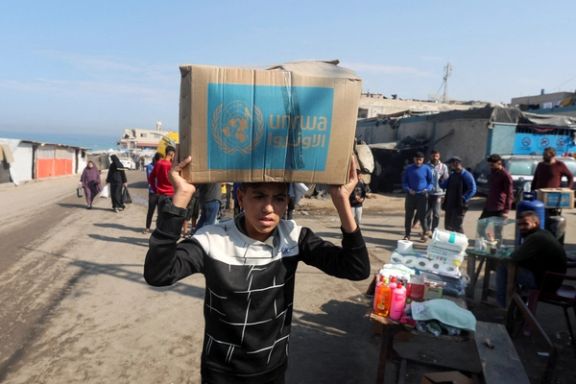Food deliveries to Gaza remain a point of contention

While the UN has accused Israel of exacerbating hunger in Gaza, Iran International observed aid deliveries entering the territory through the Kerem Shalom crossing. However, it could not verify whether the food was reaching those in need.
The crossing, located at the border shared by Egypt, Israel, and Gaza, has come under scrutiny after Philippe Lazzarini, head of the United Nations Relief and Works Agency for Palestine Refugees in the Near East (UNRWA), revealed that two recent convoys were looted by armed groups near the Gaza side of the crossing. Lazzarini called on Israel to uphold law and order in the area to ensure aid reaches its intended recipients.
Israel has accused Iran-backed Hamas of stealing aid destined for the population, around 2 million of whom have been displaced since the war which broke out on October 7 when Hamas invaded Israel.
Shimon Freedman, a spokesman for the Israeli military unit, The Coordination of Government Activities in the Territories, COGAT, which operates the crossing, flatly rejected the accusation. “I disagree with the premise that there is not enough food in Gaza,” he told Iran International during a recent visit to the area.
He said that the depot is full of food products and stressed that “the distribution capabilities of the international community is the biggest problem.”
Colonel Abdullah Halabi, who oversees the Gaza division of COGAT, said aid delivery is a problem of logistics, saying there is a need for more trucks and managers.
"Today we have more than 800 truckloads that are waiting for the international community to take them and deliver them to the people inside Gaza," said Halabi, who added that often merchandise is warehoused at the depot for lengthy periods because of the lack of international delivery capabilities.
But critics point out that as the military force controlling the area, Israel has the obligation to ensure safety of convoys that are often looted, allegedly by Hamas gunmen.
Philippe Lazzarini, the head of UNRWA, blamed Israel for the lawlessness on the Gaza side of the crossing, meaning aid needed for the population is being stolen. Lazzarini said, “The responsibility of protection of aid workers and supplies is with the State of Israel as the occupying power,” adding. “They must ensure aid flows into Gaza safely and must refrain from attacks on humanitarian workers.”
The delivery of goods into Gaza has been a source of friction between the Biden administration and Israel’s government. In October, the US government threatened to sanction Israel, including slashing its military aid, if the humanitarian situation in Gaza failed to improve.
Many Republican lawmakers aligned with president-elect Donald Trump slammed Biden’s threat. Senator Tom Cotton (R-Arkansas) wrote on X: “The United States should have no part in providing aid to Gaza for the same reason the US didn’t provide aid to Nazi Germany. Aiding Gaza will only prolong the rule of Hamas.”
Iran International observed vast crates of apples, bananas, pasta, green peas, corn, dishwashing liquid, baby supplies, water and other goods with many trucks arriving to offload and deliver goods.
The overstocked depot at Kerem Shalom does not mean that there is not a food shortage in Gaza, argue critics of Israel.
On November 26, 40 trucks went into the Gaza Strip, carrying over 600 tons of flour to support the operation of the WFP bakeries in the southern Gaza Strip. WFP also collected 52 food trucks through the Erez West crossing, for distribution in the northern Gaza Strip.
Israel has accused UNRWA of participation in the attacks of October 7 in which over 1,000 people were murdered and more than 250 taken hostage.
When approached by Iran International, a UNRWA spokesperson in Jordan declined to comment about the aid going into Gaza.
Hamas’ spokesman Bassem Naim did not respond to an Iran International WhatsApp press query. The US Treasury Department sanctioned Naim in November.
"Hamas continues to rely on key officials who seemingly maintain legitimate, public-facing roles within the group, yet who facilitate their terrorist activities, represent their interests abroad, and coordinate the transfer of money and goods into Gaza," said Bradley T. Smith, acting under-secretary for the Treasury on terrorism and financial intelligence.